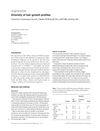 5 citations,
September 2016 in “Security science and technology”
5 citations,
September 2016 in “Security science and technology” DNA can predict physical traits like eye and hair color accurately, especially in Europeans, but predicting other traits and in diverse populations needs more research.
 1 citations,
October 2023 in “Dermatology and therapy”
1 citations,
October 2023 in “Dermatology and therapy” Some treatments for severe hair loss work but often have side effects, with baricitinib showing the most promise.
 11 citations,
January 2020 in “Skin appendage disorders”
11 citations,
January 2020 in “Skin appendage disorders” Low-level laser therapy safely and effectively improves hair growth and coverage for male and female pattern hair loss.
 April 2019 in “Journal of Investigative Dermatology”
April 2019 in “Journal of Investigative Dermatology” Low-level laser therapy helps hair growth and reduces hair loss with few side effects.
 57 citations,
September 2005 in “International Journal of Dermatology”
57 citations,
September 2005 in “International Journal of Dermatology” Frequent use of chemical hair relaxants is linked to increased scarring hair loss in Nigerian women.
12 citations,
June 2020 in “Lupus” Early treatment with the right dose of stem cells can reduce lupus symptoms.
 28 citations,
July 2017 in “Expert Review of Anticancer Therapy”
28 citations,
July 2017 in “Expert Review of Anticancer Therapy” Breast cancer patients taking CDK4/6 inhibitors are more likely to experience fatigue, hair loss, and mouth sores.
 29 citations,
October 2011 in “British Journal of Dermatology”
29 citations,
October 2011 in “British Journal of Dermatology” Certain microRNAs are more common in balding areas and might be involved in male pattern baldness.
June 2021 in “Journal of Aesthetic Nursing” PRP may help hair growth, but more research is needed.
 34 citations,
October 2007 in “International Journal of Dermatology”
34 citations,
October 2007 in “International Journal of Dermatology” The most common causes of hair loss in children in South-East Nigeria are fungal infections and alopecia areata.
 18 citations,
March 2004 in “Clinics in Dermatology”
18 citations,
March 2004 in “Clinics in Dermatology” Lupus can cause hair loss and nail changes, with treatments available for both.
 2 citations,
June 2021 in “Immunopathologia Persa”
2 citations,
June 2021 in “Immunopathologia Persa” Methotrexate is effective for rheumatoid arthritis but often causes side effects like nausea and liver issues.
 6 citations,
August 1993 in “Archives of Dermatology”
6 citations,
August 1993 in “Archives of Dermatology” A woman's hair changed to a dry, tangled texture that's hard to comb after treatment with spironolactone, suggesting the medication might cause such hair changes.
 31 citations,
October 2005 in “British Journal of Dermatology”
31 citations,
October 2005 in “British Journal of Dermatology” Hair loss in women not always linked to increased oil production; other factors may be involved.
 7 citations,
October 2022 in “Expert opinion on emerging drugs”
7 citations,
October 2022 in “Expert opinion on emerging drugs” New drugs for alopecia areata show promise but aren't universally effective, and hair loss often returns after stopping treatment.
 7 citations,
February 2022 in “Stem cell reviews and reports”
7 citations,
February 2022 in “Stem cell reviews and reports” Skin cells show flexibility in healing wounds and forming tumors, with potential for treating hair disorders and chronic ulcers.
 1 citations,
January 2015 in “Springer eBooks”
1 citations,
January 2015 in “Springer eBooks” Chemotherapy can cause skin side effects that affect patients' lives, but they can be managed to avoid interrupting cancer treatment.
 63 citations,
March 2000 in “Annals of clinical psychiatry”
63 citations,
March 2000 in “Annals of clinical psychiatry” Some psychiatric medications can cause hair loss, but it usually grows back after adjusting the medication.
 14 citations,
October 2018 in “PloS one”
14 citations,
October 2018 in “PloS one” Deleting the Far2 gene in mice causes sebaceous gland issues and patchy hair loss.
 June 2024 in “Research Square (Research Square)”
June 2024 in “Research Square (Research Square)” Increased cell death and reduced cell growth in hair follicles contribute to baldness.
3 citations,
November 2020 in “Journal of cosmetic dermatology” The scalp care solution with Timosaponin B-II improved scalp hydration, reduced dandruff, and helped prevent hair loss.
 3 citations,
March 2021 in “Metabolites”
3 citations,
March 2021 in “Metabolites” Hair loss causes differ between men and women due to changes in hormone levels and inflammation-related pathways.
 222 citations,
January 2014 in “International journal of reproductive medicine”
222 citations,
January 2014 in “International journal of reproductive medicine” Insulin resistance and obesity are key factors in the development and worsening of polycystic ovary syndrome, and lifestyle changes are important for managing it.
 115 citations,
September 2005 in “International Journal of Dermatology”
115 citations,
September 2005 in “International Journal of Dermatology” Different ethnic groups have unique hair growth patterns, with African hair growing slower and less dense, Asian hair growing fast but sparse, and Caucasian hair being densest; men are more likely to experience hair loss than women.
 16 citations,
December 2020 in “International Journal of Clinical Practice”
16 citations,
December 2020 in “International Journal of Clinical Practice” The pandemic changed how often certain skin conditions were diagnosed.
 7 citations,
May 2019 in “British Journal of Dermatology”
7 citations,
May 2019 in “British Journal of Dermatology” Transgender and nonbinary individuals experience hair loss, with transmen on testosterone seeing more severe hair loss, while feminizing hormones may stabilize hair loss in transwomen.
2 citations,
October 1961 in “Experimental Biology and Medicine” Natural feedstuffs help reduce muscular dystrophy in rabbits more than selenium or vitamin E alone.
12 citations,
October 1952 in “Experimental biology and medicine” Vitamin B12 and aureomycin reduce the negative effects of high doses of cortisone in rats.
4 citations,
July 1948 in “Experimental biology and medicine” Alcohol extraction lowers casein's nutrition, causing slower growth and hair loss in rats.
25 citations,
April 1941 in “Experimental biology and medicine” Pantothenic acid and inositol are essential to prevent hair loss in mice.























